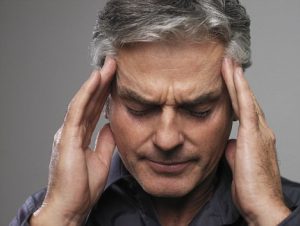By: Dr. Keith Kantor

Getting dizzy or seeing stars when you get up too quickly is not something that should be ignored; it is a sign of abnormal blood pressure and can be related to your lifestyle and behaviors.
In some people, particularly older people, blood pressure drops excessively when they sit or stand up (a condition called orthostatic or postural hypotension). Symptoms of faintness, light-headedness, dizziness, confusion, or blurred vision occur within seconds to a few minutes of standing (particularly after lying in bed or sitting for a long time) and resolve rapidly when the person lies down. Symptoms can be worse when the person has just exercised or they are dehydrated.
Dizziness or light-headedness when standing up occurs as a result of abnormal blood pressure regulation. Normally, when people stand, gravity causes blood to pool in the veins of the legs and trunk. This pooling lowers the blood pressure and the amount of blood the heart pumps to the brain. Low blood flow to the brain causes the dizziness and other symptoms. To compensate, the nervous system quickly increases the heart rate and constricts blood vessels, which rapidly returns blood pressure to normal before symptoms can develop. The part of the nervous system responsible for this compensation is the autonomic nervous system.
Here are some ways to regulate blood pressure to your optimal ranges:
- Exercise regularly incorporating cardiovascular activities like cycling or swimming, strength training exercises with weights or body weight only and flexibility/core exercises that implement deep breathing such as yoga and/or Pilates. The deep breathing itself has been shown to regulate blood pressure and relieve stress.
- Consume a healthy diet that incorporates a minimum of 9 servings of vegetables and fruits in addition to heart healthy fats from avocados, coconut oil, all natural nuts, seeds and nut butters and finally high quality certified all natural protein including poultry, seafood, beef. and pork.
In those who are healthy and experience these dizzy spells it may be an underactive adrenal gland (adrenal insufficiency). The adrenal glands are so fatigued they cannot keep up with the blood pressure upon standing, so you will feel dizzy.
Have you ever been diagnosed with a thyroid disease, leaky gut, sleep disorder or metabolic syndrome?
In most cases the adrenal glands are related to any of the above diagnosis, more then most people think.
A deeper look into adrenal glands…
The adrenals are small pea-shaped glands that sit on top of our kidneys. They are a command center for our endocrine system, which regulates metabolism, digestion, growth, development, brain function and mood.
They secrete adrenaline, cortisol and other hormones that regulate the stress response, blood pressure and water balance. Low adrenal hormone levels, caused from excessive long-term stress, can create many symptoms, including:
- Waking up tired
- General exhaustion
- Dizziness and lightheadedness
- Feeling “wired but tired”
- Lack of focus
- Craving sugar
- Hypoglycemia
- Salt cravings
- Feeling overwhelmed by life
- Having low or no sex drive
- Stubborn belly fat
- Feeling achy and “inflamed” all over
- Have trouble falling/staying asleep even though you are exhausted
- Experiencing erratic periods or severe PMS
The adrenal glands have a circadian rhythm that regulates our sleep and wake cycle. Highest cortisol production occurs between 6 a.m. and 8 a.m. and is at its lowest between midnight and 2 a.m. Those who have adrenal insufficiency cannot sleep well or they require much more sleep then the average person.
Risk associated with adrenal issues includes increased risk for diseases such as Hashimotos, Multiple Sclerosis, Leaky Gut syndrome, weight gain, and insomnia to name a few.
Would you like to know how to repair your adrenal issues?
This can be a slow process and requires patience. It is best to consult with a qualified health professional about herbal supplementation and in worst cases medications.
In regards to nutrition, avoid inflammatory foods like white flours, gluten, diary, corn, soy, this only make symptoms worse and hinders the body’s ability to repair.
Incorporate several servings (9-11 per day) of high fiber vegetables and some fruits along with healthy fats from nuts, seeds, avocados, and oils and of course chemically pure all natural certified protein in the form poultry, beef, seafood, protein shakes and eggs. Any preservatives can hinder progress of repairing the adrenal glands and related metabolic functions.
Having a balanced nutrition plan can help reduce symptoms and provide a light at the end of the tunnel to more active and vigorous lifestyle that you once thought your were losing.
For video version check out my Facebook page.
References:
http://bewellassociates.com/2017/01/28/adrenal-fatigue-why-am-i-so-dizzy/

